Right now, over 10% of all the species on Earth are facing potential extinction over the course of the 21st century. I've been talking so far about what's been causing it- today we'll be talking about the newest extinction pressure on the block- anthropogenic climate change.
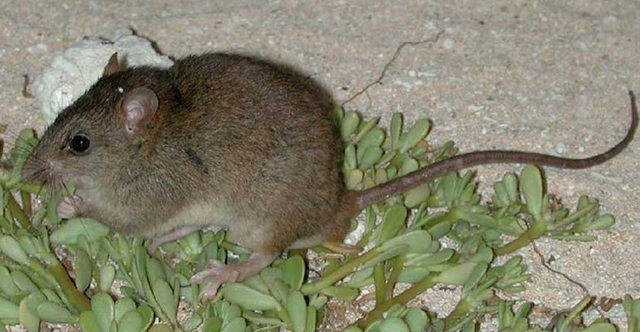
The Bramble Cay melomys, the first mammal driven extinct by climate change. Last seen in 2007, the sole Australian island this species lived on was barely above sea level, and what sea level rise we've seen so far was enough to wipe it out. [Image source]
Before we get started with that, however, I forgot an important extinction pressure caused by invasive species in the last post- hybridization. When an invasive species encounters a related native species, sometimes they can interbreed, leading to the destruction of the native species that way. This often occurs when humans do something like building a bridge across a river that had long separated two populations of a species that had evolved apart. Sometimes a new hybrid species is produced, sometimes the offspring are sterile and the native species is driven extinct, and sometimes the native species is simply absorbed into the invasive species, only leaving a few genes behind as proof. The last is what happened to Neanderthals- humanity simply absorbed them.
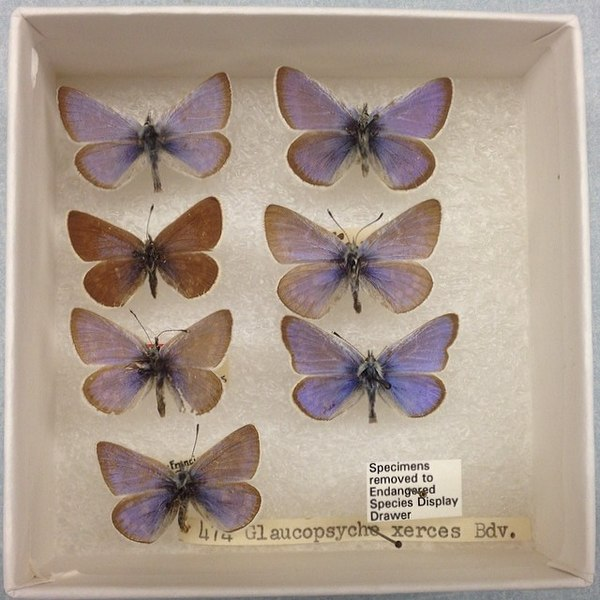
The Xerces Blue, the first, though not the last, American butterfly driven extinct by urban development. Murdered by San Francisco. Last seen in 1953.[Image source]
Climate change, like invasive species, is more of a metacategory of extinction pressure. It applies extinction pressures in a variety of different ways. Given the relatively young age of the study of climate change, as well as the fact that climate change's effects are increasing at a higher and higher rate, there haven't been as many attributed extinctions to this one yet.
The first- and deadliest- climate change related extinction pressure is habitat loss. Deserts are spreading rapidly around the globe. Ice caps and glaciers are melting, inundating low lying areas and killing off species dependent on the ice- polar bears are one of the most heavily threatened species by climate change.
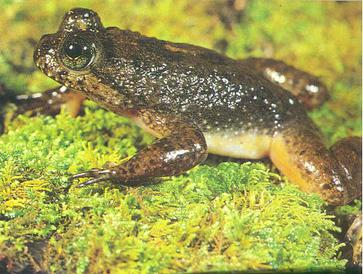
The Southern Gastric Brooding Frog, driven extinct along with its cousin, the larger Northern Gastric Brooding Frog, in the 1980s by habitat destruction and the frog killing chytrid fungus Bd. The gastric brooding frogs got their name from the bizarre habit of mother frogs raising their young in their stomachs. There is hope here, though- Australian scientists preserved ample genetic material, and are working on resurrecting the species. Embryos have already been cloned, though no tadpoles have come of it yet- but scientists are optimistic. [Image source]
Next off is simple temperature rise. Many species have quite specific temperature ranges they prefer, and simply can't cope well with rising temperatures. Coral reefs are an example of this- when their temperatures rise too high, they expel the algae that provide them with food in what is known as a bleaching event. In addition, the changes in temperature and weather pattern are causing a mismatch in seasonal signals- some species are coming out of winter dormancy earlier than others now, causing the power balance in ecosystems to change.
Another very weird example is sea turtles- the gender of sea turtles is entirely determined by the temperature of the sand they're laid in, not by genetics at all. (You can't actually tell the sex of a sea turtle with a genetic test!) This is resulting in grossly disproportionate numbers of female births as the temperature of the sand they lay their eggs in increases, putting more pressure on species that really don't need it.
Changes in precipitation levels are also a huge issue. Many species are going to be dried out or drowned as climate change alters global rainfall patterns. On top of that, increased numbers of drought lead to increased numbers and severity of forest fires, which pose an obvious threat to threatened species.
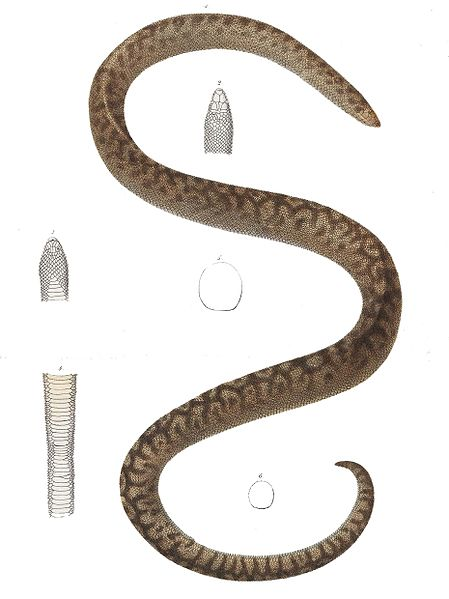
The Round Island Burrowing Boa. Last seen in 1975. Driven extinct by habitat loss thanks to overgrazing by invasive goats and rabbits.[Image source]
This next one is a bit of an oddball- ocean acidification. This isn't caused by rising temperatures, but rather by increased CO2 levels in the atmosphere, just like the global mean temperature rise itself. When raindrops travel through the atmosphere, they tend to pick up C02 atoms, which react with the water and form carbonic acid. All rain is in fact acid rain. The level of acidity, however, has been growing rapidly, increasing the acidity levels of the ocean.
The effects of ocean acidification are drastic. Many animals in the ocean- molluscs, corals, and more- all create hard shells for themselves. The most common material used is calcium carbonate. As the ocean gets more acidic, however, the carbonic acid deposited by rain reduces the available carbonate, making it harder and harder for the young of these species to get their shells started- and those that do get shells started often have thin, weak shells that provide little to no protection. Many of these shells and corals are even starting to see some minor erosion by acidity levels. Given that many of these shelled species are low on the food chain, this poses huge risks to oceanic ecosystems. The damage to coral reefs is also devastating- coral reefs are the most productive and biodiverse areas in our oceans.
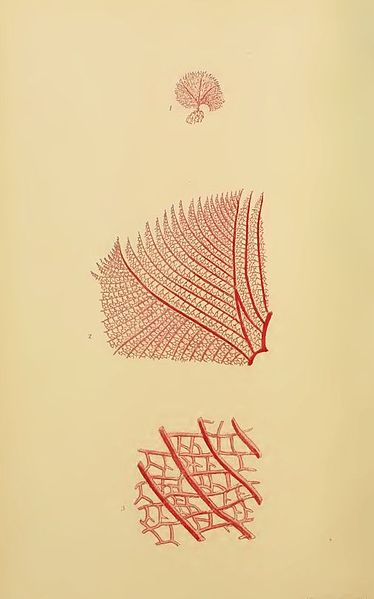
Bennet's Seaweed, one of the rare protists known to have been driven extinct by human activity. This algae grew only in Australia, and had its habitat destroyed by dredging. Last seen prior to 1916. [Image source]
Finally on this list- though there are definitely other extinction pressures applied by climate change- is migration damage. Species are being forced to migrate by the effects of climate change. This challenges them in a few ways. First off, many species can't migrate quickly enough, and are left to die in new, hostile environments. Many species can't migrate at all, due to geographical or biological limitations. Those species that can migrate are forced to compete against the native species in the ecosystems they've moved into- they've been forced into being invasive species. And while some invasive species take over and go nuts, 90% of the time they fail to take root.
There are a few different modes of this. Rising sea levels are forcing species inland, for instance. Increasing temperatures are altering altitudinal zonation as well. If you've ever climbed a mountain, you might have noticed that different plants and animals are present at different altitudes. As global temperatures increase, those zones are being forced upwards. Some species can't keep up with the pace, and others are being forced above the treeline. Some even have their preferred temperature/precipitation zone moved above the actual height of the mountain! In the mountainous western Amazon rainforest all of this is seen frequently.
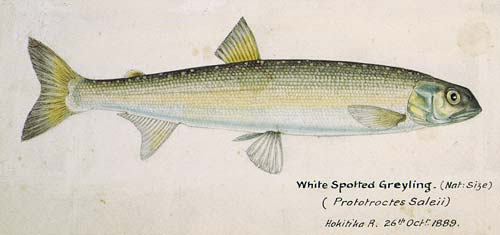
The New Zealand grayling, like salmon, spawned in lowland freshwater streams and grew to maturity in the ocean. Driven extinct by overfishing by humans and competition from invasive trout in their breeding streams. Last seen in the early 1930s.[Image source]
While climate change is just revving up to full speed, and hasn't killed quite as many species as some of the other extinction pressures, this is only a matter of time. Scientists have already identified hundreds of species directly threatened by climate change, ranging from humble algae to the mighty polar bear. And where we've found hundreds of species threatened, there are certainly thousands more- including a great many species that have never even been discovered.
Bibliography:
The Sixth Extinction, by Elizabeth Kolbert
The Song of the Dodo, by David Quammen
The Ocean of Life, by Callum Roberts
The Emerald Planet, by David Beerling
Wonderful Life, by Stephen Jay Gould
Full House, by Stephen Jay Gould
Life, by Richard Fortey
https://en.wikipedia.org/wiki/Xerces_blue
https://www.theguardian.com/environment/2016/jun/14/first-case-emerges-of-mammal-species-wiped-out-by-human-induced-climate-change
https://www.livescience.com/61368-turtle-skew.html
https://en.wikipedia.org/wiki/Round_Island_burrowing_boa
http://science.sciencemag.org/content/348/6234/571.full
https://en.wikipedia.org/wiki/Extinction
https://en.wikipedia.org/wiki/Holocene_extinction
https://en.wikipedia.org/wiki/Bramble_Cay_melomys
https://en.wikipedia.org/wiki/Extinction_risk_from_global_warming
https://en.wikipedia.org/wiki/Altitudinal_zonation
http://rspb.royalsocietypublishing.org/content/royprsb/280/1750/20121890.full.pdf
https://en.wikipedia.org/wiki/Vanvoorstia_bennettiana
https://en.wikipedia.org/wiki/New_Zealand_grayling
https://en.wikipedia.org/wiki/List_of_recently_extinct_reptiles
https://en.wikipedia.org/wiki/List_of_recently_extinct_amphibians
https://en.wikipedia.org/wiki/List_of_recently_extinct_bird_species
https://en.wikipedia.org/wiki/List_of_recently_extinct_molluscs
https://en.wikipedia.org/wiki/List_of_recently_extinct_insects
https://en.wikipedia.org/wiki/List_of_recently_extinct_fishes
https://en.wikipedia.org/wiki/List_of_recently_extinct_mammals
https://en.wikipedia.org/wiki/List_of_recently_extinct_plants

You are by far one of my favorite people that post on here. You always cite your sources and post in a "toned down" format so even average readers know what you are saying and communicating.
This part was my favorite of the post:
CaCO3 shells have shown erosion like you said, but there's also been findings of their organisms that use calcium carbonate shells creating stronger shells and even coatings over said shells. If they could keep this up or even up the rate at which they create these new shells, this would help save a lot of species. I would post a link to this but I do not have one at the moment, I remember reading this in an article one of my professors posted.
Edit: THIS is similar to what I was referring to, but not with CaCO3 shells. I talked to my professor and it's ongoing research by one of his graduate students that showed the CaCO3 shells doing similar things to the aforementioned post.
Downvoting a post can decrease pending rewards and make it less visible. Common reasons:
Submit
Aww, thanks, I'm blushing.
That's super interesting, hadn't heard of that before. If things keep going like they have, though, even that might not be enough.
Downvoting a post can decrease pending rewards and make it less visible. Common reasons:
Submit
And your link to possible correcting evolution re CaCO3 led to a link to guess what - Pelican spiders and their cousins the Trap-jaw spiders..wow!
Now my preying instincts tell me that it may just be good for this community to lure the Smithsonian lass (one Hannah M Wood), who is pertinently involved in researching above species into this web..
And seeing that I am not suitably qualified, maybe one of you guys - @mountainwashere, @holothewise, or @branbello could lay down the bait...?
Downvoting a post can decrease pending rewards and make it less visible. Common reasons:
Submit
This Hannah M. Wood?
Downvoting a post can decrease pending rewards and make it less visible. Common reasons:
Submit
Looks like her - the 'pelican spiders' link above also features her stating i.a. "At the Smithsonian's National Museum of Natural History, curator of arachnids and myriapods Hannah Wood has...", with more detail elsewhere on the page.
Downvoting a post can decrease pending rewards and make it less visible. Common reasons:
Submit
Hmm, that gastric brooding frog is a funky one. Hadn't heard of them before 👍🏻 The tricky part is going to be figuring out how to rear those tadpoles!
Downvoting a post can decrease pending rewards and make it less visible. Common reasons:
Submit
I'm kinda envisioning an adult swim cartoon about raising de-extinctified animals right now.
Downvoting a post can decrease pending rewards and make it less visible. Common reasons:
Submit
😂 you should definitely pitch this to them. Maybe to the guys who make Rick n morty :)
Downvoting a post can decrease pending rewards and make it less visible. Common reasons:
Submit
Could be fun!
Downvoting a post can decrease pending rewards and make it less visible. Common reasons:
Submit
Went a little crazy with the old referenced, didn't ya??
Downvoting a post can decrease pending rewards and make it less visible. Common reasons:
Submit
This is by far the most research intensive series of posts I've done yet. I'm seriously considering ways to shorten the bibliography for the rest of the posts in it.
Downvoting a post can decrease pending rewards and make it less visible. Common reasons:
Submit
Statistics are getting more terrifying by the day. Since you mentioned that many more yet to be identified species of animals are in danger of extinction I wonder how terrifying the true statistic would be once they are discovered, and how many of this unidentified species have already became extinct. The thought alone gives me the chill. Thanks for another informative post.
Downvoting a post can decrease pending rewards and make it less visible. Common reasons:
Submit
Thanks for reading! This has been nothing if not a depressing series of posts to write.
Downvoting a post can decrease pending rewards and make it less visible. Common reasons:
Submit
I know. You're the resident brainy-science guy in that other group where you and I ... and @catweasel hang out. But we just had to have a little extra magic from you in here to fancy up our own post. So we gave you a free ticket and a few extra incentives ... because, you can never have too many good friends. Settle into your deluxe accommodations ... and enjoy this leg of your journey.
This excellent post was included in our new curation effort The Magnificent Seven -- a collaborative work by @enchantedspirit and @catweasel. You have received a 100% upvote from each of us to show our appreciation for your post. To see your creation showcased here ... and the fine company you keep ... please visit this link.
We appreciate your support both for our work on this project and for the other creators of exceptional content who make it all possible. (Follow @catweasel to catch our future Magnificent Seven posts. He's really not as annoying as you might think. <--- He always makes me say that.)
Downvoting a post can decrease pending rewards and make it less visible. Common reasons:
Submit
Awesome, thanks!
Downvoting a post can decrease pending rewards and make it less visible. Common reasons:
Submit
haha while i kept reading this the feeling of depression was all over me :P that's why the scientists try to find other planets for the human race! the question that rises is what is happening for all of these, i get for some like the frogs and butterflies that society doesn't care a lot because it's not part of their life but things like global warming,ice melting,rise of sea level are more widespread issues that i don't think they have direct solutions
Downvoting a post can decrease pending rewards and make it less visible. Common reasons:
Submit
One of the graduate biology TAs my freshman year (1988) was already going around collecting newts to freeze in liquid nitrogen, for the purpose of saving the species.
Downvoting a post can decrease pending rewards and make it less visible. Common reasons:
Submit
Good for them!
Downvoting a post can decrease pending rewards and make it less visible. Common reasons:
Submit
I love this! I'm so glad you commented on my first post and that I checked out your blog, I've been looking for content like this to support.
Anthropogenic climate change and our current mass extinction is a topic that needs more attention. And the important thing to remember is that although humans caused these problems, humans can also find solutions for them!
Habitat fragmentation - what you were talking about with humans unknowingly separating species - can be solved buy building habitat corridors, like wildlife passes above busy freeways.
You also mentioned hybridization, which is a sad issue because since it takes generations to see effects, it oftentimes goes unnoticed. But the more people that know about these problems, the higher chance we have of fixing them.
There are so many more topics you brought up that I want to discuss, but first I should go check out parts 1 and 2, huh?
Haha, thanks for a great post!
Downvoting a post can decrease pending rewards and make it less visible. Common reasons:
Submit
Thanks for reading! I actually just posted part 4 last night, and I'll be posting part 5 tonight. And yeah, I'll be talking about habitat corridors and other solutions to these problems in post 6!
If you're looking for more people who post content like this, definitely check out the steemstem tag and @geopolis that I mentioned in my minnow guide. In addition, if you're interested in posting environmental content- which you totally should- they're great resources for helping get an early big boost to your account.
Downvoting a post can decrease pending rewards and make it less visible. Common reasons:
Submit
Whoever messed with the abundance of old style sardines - those two-an-a-half-inch ones with a delightful flavor somewhere between modern-day 'pilchards' and good old anchovies, is certainly not popular with me. And whoever can engineer them back into an affordable bracket will certainly deserve that most highly esteemed SteemNobel Award!
Downvoting a post can decrease pending rewards and make it less visible. Common reasons:
Submit
Find a way to halt severe overfishing, and we're set!
Downvoting a post can decrease pending rewards and make it less visible. Common reasons:
Submit
Regulations are not enough to stop over-fishing as it's almost impossible to get a worldwide regulation... Also, el niño years do not help the population of sardines (even though it slows over-fishing for them down a tremendous amount).
We need to save spiny and smooth dog fish (not even that closely related despite similar common names) from over-fishing too.
Downvoting a post can decrease pending rewards and make it less visible. Common reasons:
Submit
Worldwide regulation actually isn't necessary- the establishment of marine wildlife preserves generally does the trick. Fish populations restore rapidly inside them, then spread outwards from there. Plus, fishing bans in a specific area are pretty easy to enforce.
There are literally hundreds of species at risk from being overfished. 90% of all large bony fish by mass have been taken from the ocean in the last century. It's an extremely dire situation.
Downvoting a post can decrease pending rewards and make it less visible. Common reasons:
Submit
I agree with the critical effects of climate change in the present. I am from the Philippines and we had once experienced one of the strongest typhoon that have ever hit in the history. It was typhoon Haiyan.
The climate change is affecting every single part of the world and it is very alarming now.
Downvoting a post can decrease pending rewards and make it less visible. Common reasons:
Submit
Definitely!
Downvoting a post can decrease pending rewards and make it less visible. Common reasons:
Submit
What about plants? Near and dear to me because we used to have so many more of them twenty years ago are pinon trees. A couple more long droughts and we'll not have any. We have not had one snowflake this winter.
Trust me, I'm a doctor.
Downvoting a post can decrease pending rewards and make it less visible. Common reasons:
Submit
We've lost tons of plants already! Temperature and precipitation level changes are the most destructive climate change related consequences for plants, but they're being affected by really all the same extinction pressures animals are.
Pinon trees are wonderful!
Downvoting a post can decrease pending rewards and make it less visible. Common reasons:
Submit
Such an informative and concerning post, I am glad to see you use the term climate change, sadly to many picked up on the phrase global warming which people could argue against when a winter is colde than normal, but global change really captures beteer explaining the change as it affects warmer warms and colder colds and so many other changes across the planet
We humans need to take some drastic actions now to prevent the extinction of more animals and plants each one we loose puts our time on the planet more at risk
Downvoting a post can decrease pending rewards and make it less visible. Common reasons:
Submit
Another very informative post on the harsh impacts we have on climate change. Hopefully more and more people are paying attention because of your hard work. Thank you
Downvoting a post can decrease pending rewards and make it less visible. Common reasons:
Submit
Congratulations! This post has been chosen as one of the daily Whistle Stops for The STEEM Engine!
You can see your post's place along the track here: The Daily Whistle Stops, Issue #15 (1/13/18)
The STEEM Engine is an initiative dedicated to promoting meaningful engagement across Steemit. Find out more about us and join us today!
Downvoting a post can decrease pending rewards and make it less visible. Common reasons:
Submit
@originalworks
Downvoting a post can decrease pending rewards and make it less visible. Common reasons:
Submit
The @OriginalWorks bot has determined this post by @mountainwashere to be original material and upvoted it!
To call @OriginalWorks, simply reply to any post with @originalworks or !originalworks in your message!
Downvoting a post can decrease pending rewards and make it less visible. Common reasons:
Submit